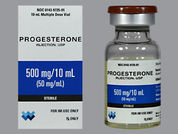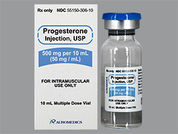Progesterone
Generic of Prometrium
What is Progesterone used for?
Progesterone is a type of hormone (progestin). This medication is similar to the progesterone that your body naturally makes and is given to replace the hormone when your body is not making enough of it. In women who are not pregnant and not going through menopause, this medication is used to restore normal menstrual periods that have stopped for several months (amenorrhea). Progesterone is also used as part of combination hormone replacement therapy with estrogens to reduce menopause symptoms (such as hot flashes). Progesterone is added to estrogen replacement therapy to reduce the risk of cancer of the uterus. This medication is not for use in children. Progesterone must not be used to test for pregnancy.
CHEMICAL NAME
DRUG TYPE
Hormonal SupplementationProgesterone Prices
Searching for the lowest prices
What does Progesterone look like?
View all Progesterone Image Information (15)Progesterone Frequently Asked Questions
Store at room temperature away from light and moisture. Do not store in the bathroom. Keep all medications away from children and pets.
Do not flush medications down the toilet or pour them into a drain unless instructed to do so. Properly discard this product when it is expired or no longer needed. Consult your pharmacist or local waste disposal company.
IMPORTANT: HOW TO USE THIS INFORMATION: This is a summary and does NOT have all possible information about this product. This information does not assure that this product is safe, effective, or appropriate for you. This information is not individual medical advice and does not substitute for the advice of your health care professional. Always ask your health care professional for complete information about this product and your specific health needs.



